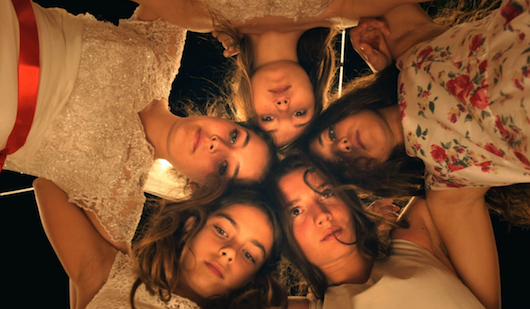
No Blood Stain
by INNAS TSUROIYA
Mustang
dir. Deniz Gamze Ergüven
97 minutes
 "If the stuffing is too soft, they're no good," Grandma (Nihal Koldas) says, teaching the girls how to fill the cooked fig leaves. "Nobody likes them soft."
"If the stuffing is too soft, they're no good," Grandma (Nihal Koldas) says, teaching the girls how to fill the cooked fig leaves. "Nobody likes them soft."
I like it soft, literally, I see the embodiment of softness onscreen — white gown matching with white drapery, gently blown by the breeze, parallel to the carefree long hair of the girls who run around so gracefully, like a scattered bouquet. I see soft daylight from a crack that seem to keep so many secrets, I see soft touch between the skin of the characters that signal reliance in each other. I see grape trees as a tender warning to the violent sound of gunfire, the celebration of happiness during a double wedding. I see running montage of the city at early morning. The end feels soft and dreamy.
Mustang is a very powerful watch, to say the least. It tells the story of five flourishing orphan sisters raised by conservative family in suburban Turkey, whose every movement can always be interpreted subversively regardless of its intention.
Sonay (İlayda Akdoğan), the eldest of them, bold and sexually alert; Selma (Tuğba Sunguroğlu), just as sexually woke but shyly discreet; Ece (Elit İşcan), the quietest of all of them but a surprise to many; Nur (Doğa Doğuşlu), reading every occasion but remaining unbothering; and Lale (Güneş Şensoy) looking up to her sisters. Despite being the youngest and smallest-looking, Lale is whom the film belongs to. As the narrating voice of Mustang, director Deniz Gamze Ergüven knew that Şensoy is fit to be the others' blindspot in her first feature film.

Being the elders’ blindspot is a major advantage when you're starring in a film about escaping the agony of patriarchy — catering to the system that is in no way beneficial to you is full of paradoxes and ridiculous contradictions. Soon after their grandma hits them one by one, their uncle takes the girls to the hospital for virginity test because they were caught playing in the Black Sea with a bunch of boys. As an aftermath of the "obscenity" they are obliged to dress in plain tunic ("shit-colored", to paraphrase Lale) to escape the male gaze, while at the same time being displayed to a neighborhood of potential suitors. They are discharged from school after the quote-unquote accident to get particular education on becoming a wife and mother.
Lale observes everyone else's eyes. Like how Sonay's are locked with her boyfriend's while slowing down her window-cleaning hand, blowing kisses from afar. Lale senses how uncomfortable Selma is, serving drinks to a bunch of strangers that will later ask for her hand in marriage. Or how Nur — arguably the closest to her of them all — angrily destroys a chair in response to grandma's accusation in the beginning of the film. All through Lale's eyes.

In Mustang, I'm moved back and forth between Lale simply providing innocent observance of the rules imposed (remember when she kissed the picture of a soccer player in a newspaper?) or thinking about strategic calculation to the rules imposed (remember when she kept noticing the plate on which her uncle placed the car key?), but it doesn't matter because she's brilliant either way. Brilliant in general, to conclude her brief driving lesson and find help via random phone numbers on used plastic bags. I'm reminded that as much as she was all that, Lale is still a kid possessed by the impulsive urge to run away to Istanbul on foot.
As much as everything is measured and/or exposed by sight, there were a few exceptions, or if I may, variations. The girls kept from the world’s sight by “imprisoning” them. Selma wants to be out of sight completely (“I wanted to disappear”). Grandma deceives herself, saying, “Children are happy, it seems." Ece blocks the view as she closes up the car window, leaving only assumptions. Nur and Lale create the world in their bedroom after the rest of their siblings part ways.

Every joke made by any of the sisters feels like an inside joke to any woman ever. Lale trys to stuff her chest — first with stolen apples, secondly with socks — to look like she had fuller breasts; "one tit bigger that the other"; childbirth role-playing; ripping off ugly dress; “access denied to male fans”; naive hand gestures; kamasutra book; or sunbathing in peace. Even the most harrowing scene in Mustang might be a dark, bitter inside joke according to how often it is to happen: marriage as a safe haven for women who have been touched by their own seemingly holier-than-thou relative. I cried when I learned everything forbidden through, again, Lale's innocuous eyes. Nothing could be more hurtful. (Sometimes I wonder if Orhan Pamuk also sobs watching this film.)
Mustang is often compared side-by-side in reference to other equally stunning films: The Virgin Suicides for the scene in which the camera shots all five sisters hugging while almost sobbing from under, or Melancholia for when Selma lay down with her wedding dress still on (“I fucked the entire world” sounds like a mantra as much as it is like a sigh out of desperation). It was very heartbreaking, especially to see the grandmother blamed for the systematic cruelty inflicted on the girls. Mustang's aesthetics transcend the grasp of time, aside from resonating youthfulness and freedom, for its Turkish specificity is what emphasizes its universality. Not only is softness conveyed onscreen, but also female pain.
Innas Tsuroiya is a contributor to This Recording. She is a writer living in Indonesia. You can find her twitter here and her tumblr here. This is her first appearance in these pages.
